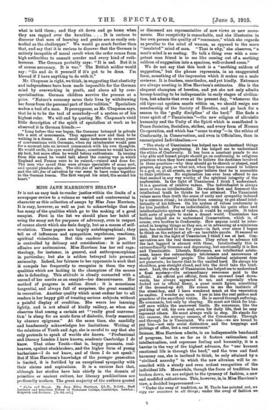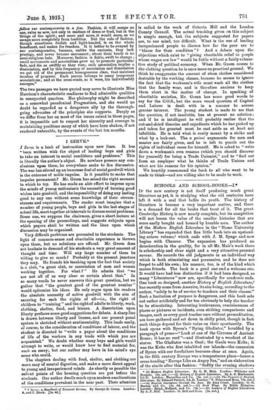MISS JANE HARRISON'S ESSAYS.*
IT is not an easy task to render justice within the limits of a newspaper review to a volume so varied and controversial in character as this collection of essays by Miss Jane Harrison. It is easy, however, as well as just to acknowledge that she has many of the qualities which go to the making of a good essayist. First in the list we should place her habit of using the essay not for purposes of advocacy, even in respect of causes about which she feels deeply, but as a means of self. revelation. These papers are largely autobiographical; they tell us of influences and sympathies, repulsions, reactions, spiritual vicissitudes. But this candour never jars. It is controlled by delicacy and consideration it is neither effusive nor acrimonious. Miss Harrison has her red rags: theology, for instance, in general, and anthropomorphism in particular; but she is seldom betrayed into personal animosity. Indeed, her fairness to her opponents is such that it compels her frequently to recognize in them the very qualities which are lacking in the champions of the causes she is defending. This attitude is closely connected with a second of her merits as an essayist--her discursiveness. Her method of progress in seldom direct, it is sometimes tangential, and always full of surprises, the great essential in recreation. Another quality which must endear her to all readers is her happy gift of treating serious subjects without a painful display of erudition. She wears her learning lightly, and is not afraid of kindly raillery, as when she observes that among a certain set "really good conversa- tion' is slang for an acute form of dialectic, freely seasoned by obscure epigrams." At the same time, she candidly and handsomely acknowledges her limitations. Writing of the relations of Youth and Age, she is careful to say that she only pretends to speak of worlds she knows. "Professional and literary London I have known, academic Cambridge I do know. That other Youth—that is, happy peasants, coal. heavers, opulent stockbrokers, and the higher form of young barbarians—I do riot know, and of them I do not speak." But if Miss Harrison's knowledge of the younger generation is limited, it is fortified by an exceptional sympathy with their claims and aspirations. It is a curious bah that, although her studies have lain chiefly in the domain of primitive or ancient culture, her literary predilections are profoundly modern. The great majority of the authors quoted • Alpha and Ortega. By Jane Ellen Harrison, LL.D... D.Litt., Star Lecture, and sometime Fellow of rievulisin College, Cambridge. Lottileit Hidswick and Jaaldn, 13s, 6d. net]
or discussed are representative of new views or new move- ments. Her receptivity is remarkable, and she illustrates in her own person the quality of "resonance," which she regards as peculiar to the mind of woman, as opposed to the more "insulated" mind of man. "That is why," she observes," a man's mind is so resting. To talk a thing over with a com- petent man friend is to me like coming out of a seething caldron of suggestion into a spacious, well-ordered room."
We do not say that this book is a "seething caldron of suggestion," but the phrase represents, in an exaggerated form, something of the impression which it makes on a male reviewer. It is fearless, unorthodox, and yet kindly. Extremes are always meeting in Miss Harrison's estimates. She is the
eloquent champion of heretics, and yet she not only admits
heresy-hunting to be indispensable in early stages of civiliza- tion, but admits that even at the present day, "whenever the old tiger-cat egotism snarls within us, we should resign our membership of the Society of Heretics, and go back f or a season to the godly discipline' of the herd." She finds a truer spirit of ." Unanimism"—the new religion of altruistic humanity and the Unity of the Spirit which is manifested is Peace Societies, Socialism, strikes, and every form of Human Co-operation, and which has "come to stay "—in the ethics of Conformity, in Conservatism, and even in Officialism, than in emancipated Individualism :—
" The study of Ifnanimism has helped me to understand things otherwise, to me, perplexing. It has helped me to understand
the ethics of Conformity. It has been a constant puzzle to me why able and honest people should go on conforming to religious practices when they have ceased to believe the doctrines involved in these practices—why they !should go to church or chapel, read prayers, say grace, or what not, when they have ceased to believe in a god, or, at all events, no longer believe that he is accessible
to their petitions. No explanation has ever been offered to me
that seemed in any way worthy of the spiritual integrity of the conformists. In the light of Unanimism I think I understand.
It is a question of relative values. The individualist is always more or less an intellectualist. He values first and foremost the intellectual truth he thinks he has attained. The Unanimist values more than truth the sense of unity and sympathy induced
bye common ritual; he shrinks from seeming to get ahead intel- lectually. of his fellow.. On his system of values conformity is for him Justified. For an individualist, with his quite other and intellectualistic system of values, it would be culpable. It takes both sorts of people to make a decent world. -IInanimism has
farther helped me to understand Conservatism, which is, of course, own brother to Conformity. How anyone could be inter- ested in keeping things as they are, or in advanaing at a minimuni pace, has remained to me for years—in fact, ever since I began to think on the subject at all—an insoluble puzzle. It seemed so dull. But in the light of Unanimison I think I see at last. Con- servatives are the real democrats. They refuse to advance till the last laggard is abreast with them. Intellectually this is extraordinarily tiresome and depressing, but emotionally it is fine
and Vnanimistic. Liberals, Reformers, are intellectual Brisk.
grate, hence the extraordinary intolerance and narrowness of nearly all 'advanced' people. The intellectual aristocrat doea
not persecute; he leaves that to the excited herd. Ile shrugs his
shoulders, goes straight ahead, and lets the devil take the hind- most. Last, the stray of 17nanimism has helped me to understand a final mystery—the extraordinary reverence paid to the
offieiaL An official qui/ official, from the crowned head down- wards, has always appeared to me, and especially when
decked out in official finery, a quasi comic figure, something
of the dressed-up doll. He rouses in me the instincts of the street-boy, and I have wondered ranch at the veneration
he excites. I wonder no more. I see in him the real pathos and grandeur of the sacrificial victim. He is sacred through suffering. lie commands, but only by obeying. He must not think for him- self save within the narrowest limits. He renounces, like the god-king of old, his own soul, even his daily life, that he may represent others. He must always walk in step. He stands for the oneness, the average oneness, of the Community. Through and through he is Unanimist We owe him—we are bound to rgty him—not only social distinction and the trappings end pickings of office, huts real reverence."
Science, Miss Harrison admits, is an indispensable handmaid of progress, but in so far as it fosters rationalism and intellectualism, and represses feeling and humanity, it is a barrier in the way of the highest advance, for "our keenest emotional life is through the herd," and the true and final harmony can, she is inclined to think, be only attained by a "civilized anarchy" in which the new altruism will be re- conciled with a steady and even ardent recognition of the
individual life. Meanwhile, though the force of tradition has broken down, we are snbject to the tyranny a fashion, a new and modified collectivism. This, however, is, in Miss Harrison's view, a decided improvement "Under the sway of tradition, as M. nude has pointed out, we copy our ancestors in all things; under the sway of fashion we follow our contemporaries in a fem. Fashion, it will escape no one, rules us now, not only in matters of dress or food, but in the things of the spirit; and more and more, it would seem, as we escape more completely from tradition. But the rule of faabion, though sometimes foolish and light-headed, is on the whole beneficent, and makes for freedom. It is better to be swayed by our contemporaries, because, unlike the ancients, they lack prestige, and never become sacrosanct ; about their heads is no semi-religious halo. Moreover, fashion is fickle, swift to change ; small movements and associations grow up to promote particular fads, and die so swiftly as they rose; each association implies a dissociation, and by this frequency of association and dissociation we get rid of the permanent homogeneous class, that insistent incubus of progress. Each person belongs to many temporary associations; and at the cross-roads, as it were, his individuality emerges."
The two passages we have quoted may servo to illustrate Miss Harrison's characteristic readiness to find admirable qualities in unexpected quarters. Her philosophy might be described as a somewhat paradoxical Pragmatism, and she would no doubt be regarded as a dangerous ally by the thorough- going advocates of the principles she supports. Deeply as we differ from her on most of the issues raised in those pages, it is impossible not to respect her sincerity and courage in maintaining positions many of which have been shaken, if not rendered untenable, by the events of the last ten months.



































 Previous page
Previous page